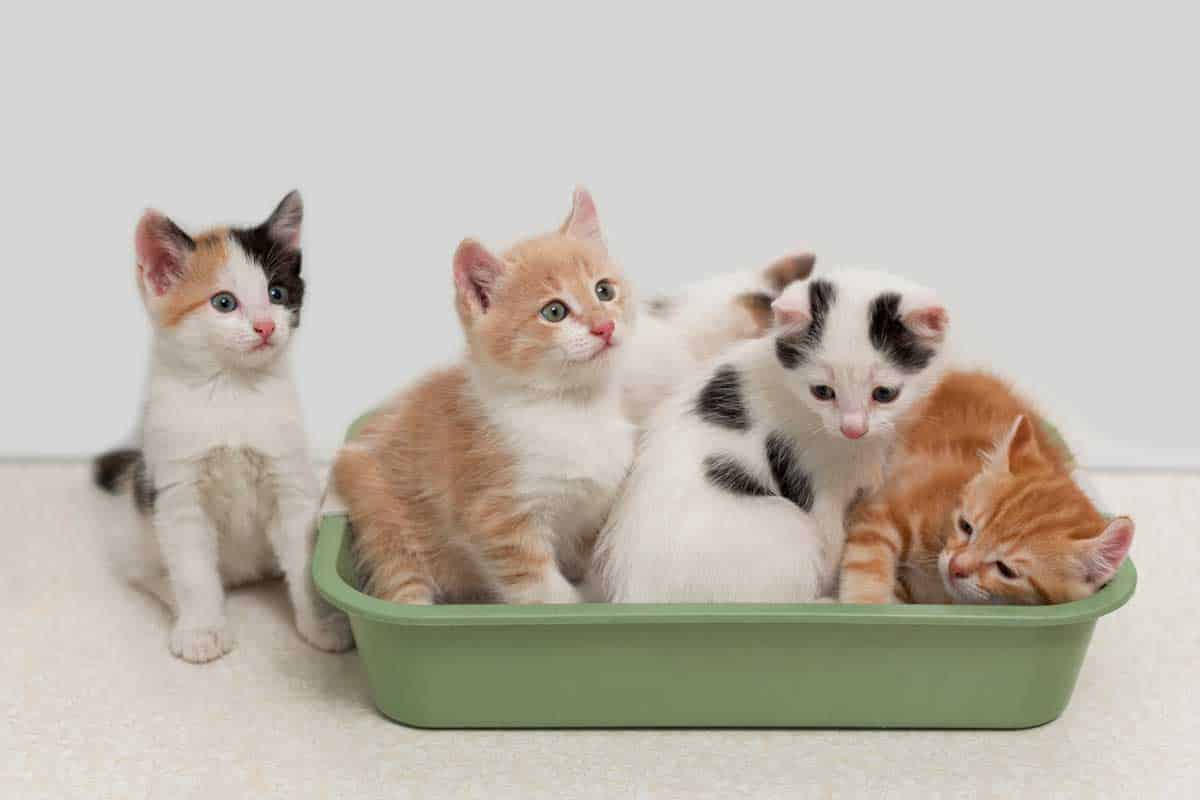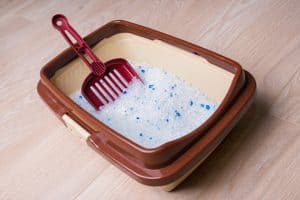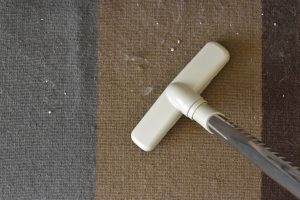It might not seem very appealing to you, especially knowing there is a fresh supply of kitty chow in the pantry. But, if you’ve noticed your cat chomping down in the litter box, you might wonder, do cats eat litter? You are not the only pet owner who has observed this unusual behavior so, we’ve researched it to find the answer.
Cats do eat cat litter. But, it is not a healthy habit. Your cat might be trying to remedy a behavioral issue or an illness. Consult your veterinarian if your cat continues to eat cat litter regularly. Ingesting clumping litter can be particularly harmful to young kittens. Consider switching to non-clumping if you're caring for young kittens.
![Cute ginger cat step outside a closed litter box. Do Cats Eat Litter? [And How to Prevent Them from Doing So]](https://litter-boxes.com/wp-content/uploads/2020/02/Do-Cats-Eat-Litter-And-How-to-Prevent-Them-from-Doing-So.jpg)
The good news is that once you’ve determined why your cat is eating litter then, you can prevent him from continuing to eat it. Keep reading and, we’ll explain several reasons why your cat or kitten might be eating cat litter and what you can do to help your cat stay healthy.
Why Is My Cat Eating Cat Litter?
Adult cats (three months of age or older) and elderly cats might have tendencies to eat cat litter for similar reasons. Paying attention to your cat’s behavior can help you to determine why she is eating litter so that you can take appropriate steps to prevent her from continuing to eat litter.
Boredom
Cats are playful, curious creatures. Young cats, in particular, often interact with their environment with their paws and mouths. No doubt you’ve seen your cat batting, pouncing, and mouthing household items like strings, blankets, plants, or cat toys.
Eating cat litter might be a sign that your cat is bored. You can prevent the ingestion of more littler by offering plenty of playtime and toys.
Pica
Pica is a compulsive disorder, the urge to eat non-food objects. Cats experiencing pica might eat cat litter, among other objects like plastic, dirt, paper, and grass.
Typically, pica is a harmless disorder that can irritate a pet owner for your cat’s constant need to chew on non-foods. Using non-toxic, non-clumping cat litter can avoid undue harm to a cat who has pica and munches litter occasionally.
Observe pica symptoms with caution; however, because if your cat eats something too large, it could result in intestinal blockage and require immediate veterinary attention. Pica can also signify other medical ailments.
Anemia
Eating cat litter can be a sign that your cat has anemia due to an iron deficiency or significant blood loss. An anemic cat lacks red blood cells and hemoglobin in his blood. If you suspect anemia, other symptoms may include pale white to bluish-colored gums, fatigue, and weakness.
Seek veterinary care for anemia because if not treated, anemia can be fatal. Use a biodegradable litter that cannot harm your cat’s health until he has recovered from the deficiency.
Vitamin or Mineral Deficiency
If your cat lacks essential vitamins or minerals in her diet, she might try to supplement the deficiency by eating cat litter. Clay-based litters, for example, may contain minerals such as sodium bentonite, calcium silicate, or quartz, to name a few.
But, cat litter is not a good source of minerals. Clay-based clumping-type litter should be replaced with biodegradable litter if you spy your cat eating it because the absorbent minerals could cause digestive blockages if too much is ingested. Your vet can test for vitamin or mineral deficiency and prescribe dietary supplements or changes for your cat.
Kidney Disease
Your cat eating cat litter might be a sign that he has kidney disease, especially for senior cats. Other symptoms of kidney disease in cats may include fatigue, increased thirst, increased frequency of urination, weight loss, decreased appetite, or vomiting.
Consult your veterinarian to examine your cat if you suspect kidney disease because it can be treated. You’ll also want to switch to biodegradable litter made from organic materials to prevent your cat from ingesting toxic or clumping litters.
Leukemia
Feline leukemia sadly causes death for 85% of infected cats within three years of diagnosis. Eating cat litter can be a sign of leukemia because one of the symptoms of the disease is anemia. Additional symptoms may include lack-luster fur, bladder infections, skin infections, upper respiratory infections, fever, or diarrhea - among others.
Your cat will need veterinary care for the diagnosis and treatment of leukemia. Changing to an organic material cat litter will also prevent any additional harm to your cat should she eat litter again during the ailment.
How to Prevent Kittens from Ingesting Litter?

Kittens most commonly eat cat litter because they are curious. Just like young children, kittens tend to explore their environment by using their mouths. Once the kitten realizes that litter is not a tasty snack, the behavior should stop.
Ingesting one or two tiny bites should not make your kitten sick but, if he continues eating cat litter, you should pause litter box training.
Additionally, you can try the following strategies to prevent your kitten from ingesting litter:
- Use non-clumping litter or litter substitute made from organic materials for kittens. Clumping litter is dangerous because once ingested, it can cause a blockage in the kitten’s digestive tract.
- Make nutritional food readily available because a hungry kitten is more likely to try to eat litter. As kittens wean from their mother’s milk (eight-weeks of age or older), they should be offered wet or canned foods. Kittens who shy away from solid foods might need to be given a milk substitute until they consistently eat solid food on their own.
- Provide ample playtime. Bored kittens are more likely to be led astray by curiosity.
- Consult your veterinarian to check if the kitten has a vitamin or mineral deficiency or anemia. Deficiencies can be treated with supplements. Treating anemia might require a blood transfusion, but, if left untreated, anemia can kill your kitten.
- Consult your veterinarian to check if the kitten has worms, parasites, or an infection.
When your kitten has stopped eating cat litter and been deemed healthy, you can resume litter box training.
Why is My Elderly Cat Eating Cat Litter?
Elderly cats (seven months of age or older) are susceptible to kidney disease because aged kidneys become less efficient and must work harder to filter waste from the cat’s blood. Eating cat litter is a symptom of kidney disease, in addition to weight loss, depression, weakness, and vomiting.
What Will Happen if a Cat Eats Cat Litter?
If your adult cat eats biodegradable litter made from organic materials, the litter will likely pass through your cat’s digestive system without causing any illness or damage.
Cats that eat clumping-type litter are at high risk for a digestive blockage to occur because the clumping component in the litter will absorb liquid and continue to expand in the cat’s system. Seek veterinary assistance if your cat has eaten a substantial amount of clumping cat litter. Replace your litter as soon as possible with an organic material litter.
Can Cat Litter Make Your Cat Sick?
![Cute ginger cat step outside a closed litter box. Do Cats Eat Litter? [And How to Prevent Them from Doing So]](https://litter-boxes.com/wp-content/uploads/2020/02/Cute-ginger-cat-step-outside-a-closed-litter-box..jpg)
Eating a small amount of litter is unlikely to make your adult cat sick. However, your cat might be eating the litter because he is already ill. Eating litter is typically an attempt to remedy a nutritional deficiency, medical disease, or behavioral disorder. So, closely observe your cat try to determine why he is eating litter so you can help to get him healthy again.
Can Cats Die From Eating Cat Litter?
Kittens are more likely to die from ingesting clumping-type litter than adult cats because their small, developing digestive tracts and stomachs cannot withstand the absorbent material continuing to expand after it has been eaten. If a kitten eats a substantial amount of clumping litter or litter containing toxins, she will need immediate veterinary attention.
Adults cats are less likely to die from eating cat litter because their digestive systems can process the litter more easily. However, clumping litter is still dangerous for adult cats.
Using litters made from organic materials can prevent death for kittens and cats. Healthy cats usually don’t try to eat litter, but, now knowing that it is a sign of sickness, you can get your cat on a healthy track if you notice she is snacking in the litter box.


![cat examines kitty litter box with eco-friendly silicate litter - Can You Wash and Reuse Crystal Cat Litter? [Answered]](https://litter-boxes.com/wp-content/uploads/2023/08/cat-examines-kitty-litter-box-with-eco-friendly-silicate-litter-300x200.jpg)
